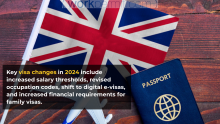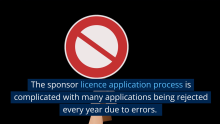Support migrant centric journalism today and donate

 • Media Center » Video Immigration News
• Media Center » Video Immigration News
The United States Citizenship and Immigration Services (USCIS) is dealing with an enormous backlog of US immigration applications and petitions in the wake of a sharp increase in fees at the end of July 2007.
Ironically, the justification for raising the fees was to help in processing backlogs. However, USCIS did not anticipate the amount of application and petitions received during the summer of 2007.
"Such volume in just a short couple of months is unprecedented in the history of immigration services of our nation," USCIS Director Emilio T. Gonzalez said in written testimony before a House Judiciary Subcommittee on immigration.
Gonzalez's testimony stated that, historically, surges in filings in advance of fee increases were followed by an equal dip in filings, so that annual numbers even out. However, Gonzalez said that this is unlikely to be the case this year.
From June through August of 2007, over three million applications and petitions of all types (adjustment of status, citizenship, etc) were received by USCIS, compared to 1.8 million received during the same period in 2006.
In Fiscal Year 2007, USCIS received close to 1.4 million citizenship applications -- almost double the number received during the previous fiscal year. For the months of June and July of 2007, immediately preceding the large fee increases, citizenship applications saw an increase of 350 percent compared to the same period in 2006.
"In an average month, USCIS [general immigration applications] are about 530,000," Gonzalez said.
USCIS has responded to the surge by increasing work hours, adding shifts, and hiring contract staff, among other adjustments to meet the load. His agency has also implemented a response plan to deal with the backlog and future filings, which includes hiring more staff and improving technology and administrative efficiency.
However, many others are still waiting on processing and future delays are expected.
"This surge will have a serious impact on application processing times for the next couple of years," Gonzalez said. "As a result, based on our response plan, most customers will wait much longer to have their applications completed."
He stated that the average processing time of seven months for citizenship applications would increase to 18 months. Adjustment of status applications for family-based immigration applications would increase from the current six-month average to less than 12 months. However, he indicated that the delays would be temporary.
"Our two-year response plan will help us accomplish reducing processing times to six months by the third quarter of Fiscal Year 2010," said Gonzalez.






















